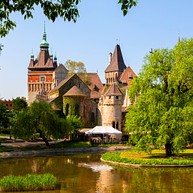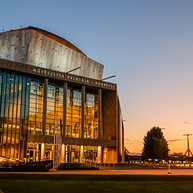
-
![heroes square budapest]() Provided by: Slavko Sereda/Shutterstock.com
Provided by: Slavko Sereda/Shutterstock.com

Our travel guides are free to read and explore online. If you want to get your own copy, the full travel guide for this destination is available to you offline* to bring along anywhere or print for your trip.
*this will be downloaded as a PDF.Price
€4,95
Heroes' Square
The guide was updated:Situated at the end of Andrássy Avenue, Heroes' Square is one of Budapest's most iconic landmarks. Dominated by the Millennium Monument, it pays homage to Hungary's history and leaders. It is flanked by the Museum of Fine Arts and the Palace of Art, and if you continue your way past the wall of sculptures, you'll reach City Park with Vajdahunyad Castle.
Useful Information
- Address: Budapest, Hősök tere
Digital Travel Guide Download
Our travel guides are free to read and explore online. If you want to get your own copy, the full travel guide for this destination is available to you offline* to bring along anywhere or print for your trip.
*this will be downloaded as a PDF.Price
€4,95

Spanning the majestic Danube River, the Széchenyi Chain Bridge stands as an iconic symbol of the city's grandeur and architectural prowess. Completed in 1849, it was the first permanent bridge to connect the Buda and Pest sides of the city. Designed by English engineer William Tierney Clark and later modified by Scottish engineer Adam Clark, the bridge's chain-link structure and ornate stone lions guarding its entrances evoke a sense of timeless elegance and pride. The lions guarding the bridge are also connected to the first suicide that happened here, committed by their architect upon the realisation that he had forgotten about the tongues of the animals.
Read more

Hungarian Parliament Building
The Parliament is arguably the most prominent landmark of Hungary, also noted as the third largest parliament building in the world. It was designed in the Gothic revival style by architect Imre Steindl. It is 96 metres tall, which refers to the year 1896 when extensive constructions were carried out to celebrate the country's millennium.
Read more

Castle District
The charming district of the Buda Castle entails the prominent Fisherman's Bastion, Matthias Church, several museums, as well as some residential homes. You'll find the National Gallery here, along with a wide range of other museums dedicated to music, military history, pharmacy (housed in the first pharmacy of Buda), and the life of Houdini. Take a stroll under the blossoming trees of Tóth Árpád sétány, watch the change of the guard, and make your way back to the city centre by descending on the most scenic funicular in the world.
Read more

Danube River Sightseeing Night Cruise
Marvel at Budapest's UNESCO-listed panorama on this lovely Danube River evening cruise. See the city's floodlit landmarks, such as the Hungarian Parliament and the Buda Castle district, and sail under the illuminated Chain Bridge as well as other bridges.
Bookable
Read more

St Stephen's Basilica
St Stephen's Basilica is the largest church in Budapest. It was built in Neo-classicist style and has a capacity of up to 8,500 people. Its most noted relic is the mummified right hand of Stephen I, Hungary's first king, who among others converted Hungarians to Christianity. The adjacent square is home to several markets throughout the year and is lined by terraces of trendy bars and cafés.
Read more

Heroes' Square
Situated at the end of Andrássy Avenue, Heroes' Square is one of Budapest's most iconic landmarks. Dominated by the Millennium Monument, it pays homage to Hungary's history and leaders. It is flanked by the Museum of Fine Arts and the Palace of Art, and if you continue your way past the wall of sculptures, you'll reach City Park with Vajdahunyad Castle.
Read more

Dohány Street Synagogue (The Great Synagogue)
The distinct symbol of the Jewish quarter in Budapest, the Great Synagogue is also noted as the largest synagogue in Europe, seating up to 3,000 people. The visit entails a guided tour with a walk in the building and its surrounding garden, where you will also find sculptures of famous Hungarian writers and artists of Jewish origin. There is also a Jewish museum beside the synagogue, not to be confused with the Holocaust Memorial Centre further away on Páva Street.
Read more

Shoes on the Danube Bank
Conceived by film director Can Togay, Shoes on the Danube Bank is an ironwork memorial erected in 2005 consisting of sixty pairs of shoes, which pays tribute to the thousands of Jewish victims who were shot into the Danube during the Arrow Cross movement in 1944-45. With over 800,000 people expelled or killed, the Hungarian Jewish community is regarded as one of the biggest victims in the dark era of the Holocaust.
Read more

Hungarian State Opera
The Hungarian State Opera is a neo-Renaissance masterpiece, boasting the third-best acoustics in Europe after the Scala in Milan and the Opera Garnier in Paris. It was designed in 1884 by Miklós Ybl, who also planned St Stephen’s Basilica. Lavish inside and out with a gorgeous fresco by Károly Lotz gleaming in a vast bronze chandelier in the Main Hall, the Opera is home to the Hungarian National Ballet founded the same year.
Read more

Margaret Island (Margitsziget)
The 2.5-km-long Margaret Island between Buda and Pest makes for a perfect lazy day outside the bustling city centre. The island is home to a small zoo, an art nouveau water tower, medieval ruins, and a beloved musical fountain. It also offers an array of outdoor activities with jogging tracks, thermal spas, and swimming pools. During the summer, Margaret Island comes alive with bars, restaurants, and live music.
Read more

City Park (Városliget)
Stretching behind the imposing Heroes' Square, Városliget is one of the most popular recreational venues in the city. There are plenty of entertainment options in the neighbourhood, including the Széchenyi Baths, Budapest Zoo, Circus, the Vajdahunyad Castle housing the Agricultural Museum and various fairs, as well as a pond that turns into a popular ice rink in the winter season.
Read more

Museum of Fine Arts
Built in an eclectic-neoclassical style, between 1900 and 1906, the Museum of Fine Arts houses a vast collection spanning from prehistory to the present day. Highlights include an impressive Egyptian collection, Renaissance frescoes, and an array of 19th-century paintings.
Read more

Palace of Arts (Müpa Budapest)
Known locally by its acronym Müpa, the Palace of Arts (Művészetek Palotája) is a striking complex by the Danube created for the new millennium. It consists of the Bartók National Concert Hall, the Festival Theatre and the Ludwig Museum. The Bartók National Concert Hall is known for its outstanding acoustics created by Russell Johnson, who worked with some of the world’s most renowned architects. This is also the home of the prestigious Hungarian National Philharmonic, founded in 1923. The Ludwig Museum's exhibition space displays artwork by modern and contemporary artists, and it is open all year round.
Read more

Citadella
A fortress built under the Austrian empire and used also by fascist and communist forces, Citadella sits atop the 235-metre high Gellért Hill, together with the Liberty Statue, a bronze lady holding a palm leaf and guarding the city since 1947 (hence was originally intended to celebrate the Soviet liberation from the Nazi forces after WWII).
Read more

Hungarian National Museum
Housed in a beautiful neoclassical building along what is called the small boulevard of Budapest, this museum houses various permanent and temporary exhibitions on the history of Hungary, starting from the Roman period, when the province of Pannonia stretched far beyond the present borders of the country.
Read more

House of Terror
Located in what once was the headquarters of ÁVH, the secret police authority of the communist era, the House of Terror gives a strikingly honest insight into the history of fascism and communism, the two terror regimes Hungary suffered from in the not-so-distant history. It is also a memorial to the victims of these regimes, including those detained, interrogated, tortured, or killed in the building.
Read more

Tram Line 2
Regarded by the National Geographic among the most scenic tram routes in the world, these yellow trolleys will help you discover Budapest's most beautiful buildings for the price of a single tram ticket. Make sure you do it at night (as well), to see the splendid city lights illuminating the elegant Buda hillside.
Read more

Elizabeth Lookout Tower
Only 20 minutes by bus, and you will find yourself in the midst of unspoilt greenery without even setting foot out of the capital. Start your trip by taking the bus to the Normafa parks, and try the best strudel in the city with scenic views over the Buda hills. From here stretches a short hiking trail all the way up to the lookout tower with cafés, playgrounds, and a funicular. From the top of the lookout tower, you will be rewarded with breathtaking views that at clear times even encompass the peak of the High Tatras.
Read more

Memento Park
An imposing sculpture park paying homage to the era of Cold War and communism. When the proletarian dictatorship’s enormous monuments and statues were no longer considered politically correct, they were moved from their conspicuous locations to this southern suburb of Buda. Works to see include the gigantic Lenin statue and the Cubist statues of Marx and Engels.
Read more

Aquaworld Aquapark
One of the biggest indoor water theme parks in Europe offers unforgettable entertainment to visitors of every age throughout the year.
Read more


